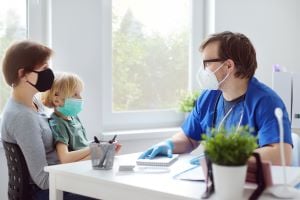Share this
pediatric clinical trials: microsampling gives kids a better experience
by Neoteryx Microsampling on Jun 14, 2021 9:00:00 AM
 Children often benefit from off-label use or new applications of prescription drugs, but they are not always well-represented in clinical research studies. One explanation is that children require special considerations when they are involved in clinical trials. Their welfare and wellbeing are of utmost importance. The willingness of the child’s family to support the child through the study also matters.
Children often benefit from off-label use or new applications of prescription drugs, but they are not always well-represented in clinical research studies. One explanation is that children require special considerations when they are involved in clinical trials. Their welfare and wellbeing are of utmost importance. The willingness of the child’s family to support the child through the study also matters.
Several reasons deter families from enrolling their children as participants in clinical trials. Some parents worry about the adverse side effects of new, untested drugs on their children. Others fear there will be no health improvement despite their child undergoing tests and taking drugs for a long-term trial.
Other obstacles to participation in pediatric clinical trials include:
- Emotional and psychological impact – Children with chronic conditions that require frequent medical visits may associate the visits with pain and trauma, particularly if they involve needles for specimen collection and lab tests. This negative association may cause them to be less willing to comply with their medical care during or after pediatric clinical trials.
- Lost time, learning, and wages – Participation in clinical trials usually means absence from work or school for the study participants as they attend appointments for monitoring and follow-up. Traveling to and from the trial site to participate in the studies is also time-consuming and inconvenient.
- Pain, stress, or trauma – Clinical trials require routine blood testing, and poking a needle into a child's vein to draw blood can be painful. It is also stressful for parents to watch their child scream in pain and know the process will be repeated.
Remote Microsampling Is Changing the Clinical Trial Landscape
Since the 2020 coronavirus pandemic, clinical trials underwent changes as researchers turned their attention to fighting SARS-CoV-2 and Covid-19 illness. Scientists found creative ways to conduct their research when in-person visits were scrapped. They started performing trial "visits" virtually via video chats, mailing out medications and supplies, and asking participants to monitor their vitals at home. All this was an advantage to pediatrics research groups undertaking clinical trials.
Remote or decentralized pediatric clinical trials are now on the increase. Some trial managers are scheduling an initial onsite visit for training or orientation, and then conducting the remainder of the trial via a telehealth model. A game-changing approach is to mail specimen collection kits to families at home. Specimen collection at home that is performed by a parent or other caregiver is less traumatizing for a child participating in pediatric studies. Stress and discomfort are reduced with at-home kits because they allow kids to stay in familiar surroundings for the specimen collection event, and the collection methods are minimally invasive—no big needle pokes in the arm.
One at-home kit is the Neoteryx Mitra® Collection Kit, a remote specimen collection kit for self-collection by study participants. The Mitra® devices in the kit are specially designed to easily collect bio-fluids such as blood, saliva, or urine. The kits come with easy-to-follow instructions and all the supplies needed for specimen collection. Videos are also available online for additional guidance. Families can help their children collect small "microsamples" for scientific analysis.
Study participants’ parents can then mail the samples on the same day they collect them to the designated lab in pre-paid packaging. After the specimen samples have been analyzed in the lab, research staff can follow-up and monitor study participants through web-based portals and video chat calls via Zoom or other video platforms.
With remote microsampling, it’s now easier to recruit and retain volunteers in virtual, or decentralized, pediatric clinical trials. Families appreciate the ease and convenience of participating in a trial from home, and are more likely to remain committed throughout the term of the study.
“We can now collect a sample at home using the device, mail it to the lab, and get accurate results without ever leaving home," says Caroline Knapp, the mother of a young kidney transplant patient enrolled in a remote pediatric therapeutic drug monitoring program in the United Kingdom. "The method is more convenient, as we don’t need to spend a whole day at the clinic for a blood test or visit, which leaves more time for school attendance.”

Share this
- Microsampling (206)
- Research, Remote Research (119)
- Venipuncture Alternative (105)
- Clinical Trials, Clinical Research (83)
- Mitra® Device (73)
- Therapeutic Drug Monitoring, TDM (51)
- Dried Blood Spot, DBS (39)
- Biomonitoring, Health, Wellness (30)
- Infectious Disease, Vaccines, COVID-19 (24)
- Blood Microsampling, Serology (23)
- Omics, Multi-Omics (21)
- Decentralized Clinical Trial (DCT) (20)
- Specimen Collection (18)
- Toxicology, Doping, Drug/Alcohol Monitoring, PEth (17)
- Skin Microsampling, Microbiopsy (14)
- hemaPEN® Device (13)
- Preclinical Research, Animal Studies (12)
- Pharmaceuticals, Drug Development (9)
- Harpera Device (7)
- Industry News, Microsampling News (5)
- Antibodies, MAbs (3)
- Company Press Release, Product Press Release (3)
- Environmental Toxins, Exposures (1)
- July 2025 (1)
- May 2025 (1)
- April 2025 (2)
- December 2024 (2)
- November 2024 (1)
- October 2024 (3)
- September 2024 (1)
- June 2024 (1)
- May 2024 (1)
- April 2024 (4)
- March 2024 (1)
- February 2024 (2)
- January 2024 (4)
- December 2023 (3)
- November 2023 (3)
- October 2023 (3)
- September 2023 (3)
- July 2023 (3)
- June 2023 (2)
- April 2023 (2)
- March 2023 (2)
- February 2023 (2)
- January 2023 (3)
- December 2022 (2)
- November 2022 (3)
- October 2022 (4)
- September 2022 (3)
- August 2022 (5)
- July 2022 (2)
- June 2022 (2)
- May 2022 (4)
- April 2022 (3)
- March 2022 (3)
- February 2022 (4)
- January 2022 (5)
- December 2021 (3)
- November 2021 (5)
- October 2021 (3)
- September 2021 (3)
- August 2021 (4)
- July 2021 (4)
- June 2021 (4)
- May 2021 (4)
- April 2021 (3)
- March 2021 (5)
- February 2021 (4)
- January 2021 (4)
- December 2020 (3)
- November 2020 (5)
- October 2020 (4)
- September 2020 (3)
- August 2020 (3)
- July 2020 (6)
- June 2020 (4)
- May 2020 (4)
- April 2020 (3)
- March 2020 (6)
- February 2020 (3)
- January 2020 (4)
- December 2019 (5)
- November 2019 (4)
- October 2019 (2)
- September 2019 (4)
- August 2019 (4)
- July 2019 (3)
- June 2019 (7)
- May 2019 (6)
- April 2019 (5)
- March 2019 (6)
- February 2019 (5)
- January 2019 (8)
- December 2018 (3)
- November 2018 (4)
- October 2018 (7)
- September 2018 (6)
- August 2018 (5)
- July 2018 (8)
- June 2018 (6)
- May 2018 (5)
- April 2018 (6)
- March 2018 (4)
- February 2018 (6)
- January 2018 (4)
- December 2017 (2)
- November 2017 (3)
- October 2017 (2)
- September 2017 (4)
- August 2017 (2)
- July 2017 (4)
- June 2017 (5)
- May 2017 (6)
- April 2017 (6)
- March 2017 (5)
- February 2017 (4)
- January 2017 (1)
- July 2016 (3)
- May 2016 (1)
- April 2016 (2)


No Comments Yet
Let us know what you think